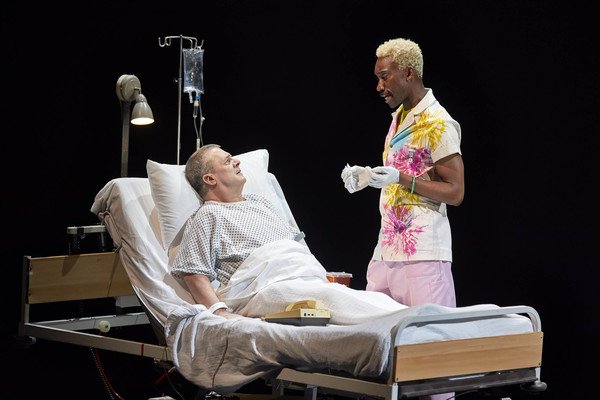Review: ANGELS IN AMERICA Revival Flies In The Face of Trump Presidency
It wasn't exactly a stellar weekend for Donald Trump. Nationwide protest rallies condemned his party's relationship with the NRA, a woman revealed on national television that her life was threatened if she went public with details of their affair, and as for the cherry on top, ANGELS IN AMERICA: A GAY FANTASIA ON NATIONAL THEMES has returned to Broadway.

(Photo: Brinkhoff & Mogenburg)
Of course, the President's connection to Tony Kushner's epic 1990s drama wouldn't have been in the minds of current Broadway playgoers had it not been reported that, when questioning the loyalty of Attorney General Jeff Sessions, the president blurted, "Where's My Roy Cohn?", referring to his devoted pit bull of an attorney whose resume included prosecuting Julius and Ethel Rosenberg for espionage and served as chief counsel for Senator Joe McCarthy during both his Red Scare witch hunt and his lesser-known Lavender Scare, where numerous alleged homosexuals were removed from their government positions.
Spoken of by Trump as a friend and an inspiration, Cohn was diagnosed with AIDS in 1984 and, despite access to trial dosages of AZT, died two years later, always insisting he was suffering from liver cancer.
But his infamy was resurrected in 1992 when part one of Kushner's drama, "Millennium Approaches," opened at London's National Theatre after a premiere by San Francisco's Eureka Theatre Company. "Millennium Approaches" opened on Broadway in 1993 and was eventually joined in repertory by part two, titled "Perestroika," which premiered at Los Angeles' Mark Taper Forum before arriving at the National.
As one of the play's central characters, the brutish bullying of Cohn and his attempt to utilize his privilege to access treatment while denying it to the gay population he publicly despised was a sobering representation of the American government's response to the epidemic during the Reagan years.
Despite the one real-life character, ANGELS IN AMERICA is a work of fiction made up of numerous vignettes involving an ensemble of characters whose stories intertwine. The gloriously beating heart of the piece is Prior Walter, a gay man with AIDS who is abandoned by his lover who cannot deal with the situation. Prior's visions of heaven include appearances by his ancestors and the grand entrance of an angel who declares him to be a prophet.
The thrilling and heart-gripping new production of ANGELS IN AMERICA (both parts) again originated at the National before reaching Broadway. It is directed by Marianne Elliott, known to New York audiences for her London transfers of War Horse and THE CURIOUS INCIDENT OF THE DOG IN THE NIGHT-TIME, two plays that, on paper, were thin narratives that required Elliott's vivid directorial pictures to be fully realized.
Here, she's working with a literary masterpiece, and while there are some striking visuals, the focus is fully on Kushner's words and storytelling. Including intermissions, audiences commit to nearly eight hours of theatergoing, but it's an invigorating experience that seems to fly by.
Nathan Lane, whose skills as a dramatic actor are often severely overlooked, has never been better than he is as Roy Cohn. At first, he seems the familiar funnyman audiences are accustomed to, alternately screaming his dominance into the phone ("You think I'm the only goddamn lawyer in history ever missed a court date?") while placating clients with theatre recommendations ("It's about cats!"), but as the character comes face to face with his own mortality, the mixture of arrogance, privilege and desperation grow to frightening levels. Cohn is a monster until the end, and with Lane embodying him, it's all the more horrifying that he's a completely realistic one.
But in the hands of the sensational Andrew Garfield, Prior deals with his personal tragedy with poetic grandeur. He reveals his first visible lesion as "the wine-dark kiss of the angel of death" and quotes Norma Desmond with ironic verve. Yes, the audience sees him suffer horribly, but he uses camp as a sword in a battle not just for his life, but for his right to live his life as he sees fit, despite those who would call the plague a punishment to gay men sent directly from heaven.
As portrayed by Amanda Lawrence, the angel Prior envisions is a ferocious symbol of strength, designed by Finn Caldwell and Nick Barnes, with massive bird wings manipulated by onstage puppeteers.
Beautiful work is done throughout by the company of eight actors, who all double as realistic characters and fantasia roles. The complexities by which they connect are best explained by the author.

(Photo: Brinkhoff & Mogenburg)
As Louis, the man who leaves Prior, James McArdle's empathetic display of the fellow's guilt and emotional needs may have audience member questioning how noble they themselves may be in that situation. Lee Pace effectively displays the appearance of content moral conformity as Joe Pitt, a Mormon who struggles with his sexual identity. Denise Gough is an intriguing presence as his Valium-addicted wife, Harper, who is given to hallucinations involving the state of their marriage, and Susan Brown does chameleon work playing several men and women, including Joe's mother, a male rabbi and Cohn's vision of Ethel Rosenberg.
Nathan Stewart-Jarrett is excellent in the play's only track specified to be played by a black man, doubling as the slick travel agent who inhabits Harper's hallucinations and, more prominently, as the sardonically humored former drag queen-turned-nurse, who provides emotional support for Prior and tends to the hospitalized Cohn - countering his patient's displays of racism and homophobia with no-nonsense verbal finesse.
While the AIDS epidemic has certainly not been completely conquered, it is no longer the automatic death sentence it was in ANGELS IN AMERICA's mid-1980s setting, so in that respect the play can be seen as a bit of a history lesson. But, as the full title indicates, Kushner uses the plague as means by which to address themes that are still with us today; perhaps most prominently the commercialization of health care, the hypocrisy hidden by elected leaders, and the effort to guide the country by religious morals. Is eight hours really enough for all of that?
Reader Reviews

Videos

